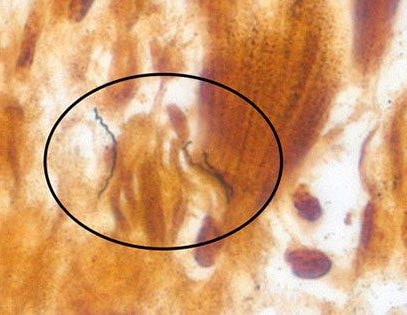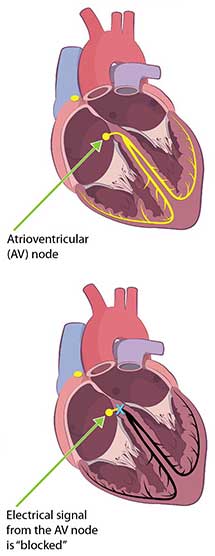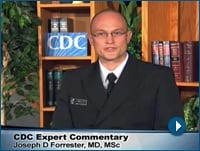Lyme carditis
What is Lyme carditis?
Lyme carditis occurs when Lyme disease bacteria enter the tissues of the heart. This can interfere with the normal movement of electrical signals from the heart’s upper to lower chambers, a process that coordinates the beating of the heart. The result is something physicians call “heart block,” which can vary in degree and change rapidly. Lyme carditis occurs in approximately one out of every hundred Lyme disease cases reported to CDC.
What are the symptoms?
Lyme carditis can cause light-headedness, fainting, shortness of breath, heart palpitations, or chest pain. Patients with Lyme carditis usually have other symptoms such as fever and body aches, and they may have more specific symptoms of Lyme disease, such as the erythema migrans rash.
How is it treated?
Lyme carditis can either be treated with oral or intravenous (IV) antibiotics, depending on severity (see tables below). Some patients might need a temporary pacemaker. Patients generally recover within 1-6 weeks.
Can it be fatal?
Yes. Between 1985 and 2019, eleven cases of fatal Lyme carditis were reported worldwide.
Key Points for Healthcare Providers
- Ask all patients with suspected Lyme disease about cardiac symptoms, e.g., palpitations, chest pain, light headedness, fainting, shortness of breath, and difficulty breathing with exertion.
- Ask patients with acute, unexplained cardiac symptoms about possible tick exposure and symptoms of Lyme disease.
- Treat patients with suspected Lyme carditis with appropriate antibiotics immediately – do not wait for Lyme disease test results. Patients with suspected severe Lyme carditis require immediate hospitalization for cardiac monitoring and intravenous antibiotics.
- Talk to patients about tick bite prevention.
Antibiotic Treatment of Lyme Carditis
Table 1. Mild (1st degree AV block with PR interval <300 milliseconds)
| Age Category | Drug | Dosage | Maximum | Duration (days) | References |
|---|---|---|---|---|---|
| Adults | Doxycycline | 100 mg, twice per day orally | N/A | 14-21 | 4; 6-7; 13 |
| Amoxicillin | 500 mg, three times per day orally | N/A | 14-21 | ||
| Cefuroxime | 500 mg, twice per day orally | N/A | 14-21 | ||
| Children (any age) |
Doxycycline | 4.4 mg/kg per day orally, divided into 2 doses | 100 mg per dose | 14-21 | 3; 5 |
| Amoxicillin | 50 mg/kg per day orally, divided into 3 doses | 500 mg per dose | 14-21 | 3 | |
| Cefuroxime | 30 mg/kg per day orally, divided into 2 doses | 500 mg per dose | 14-21 | 3 |
Table 2. Severe (symptomatic, 1st degree AV block with PR interval ≥300 milliseconds, 2nd or 3rd degree AV block)*
| Age Category | Drug | Dosage | Maximum | Duration (days) | References |
|---|---|---|---|---|---|
| Adults | Ceftriaxone | 2 grams intravenously, once a day* | N/A | 14–21 | 1-2; 6-11; 13 |
| Children (any age) |
Ceftriaxone | 50–75 mg/kg intravenously, once a day* | 2 grams per day | 14–21 | 3; 5; 12 |
*After resolution of symptoms and high-grade AV block, consider transitioning to oral antibiotics to complete treatment course (Table 1).

Tissue sample from a patient who died of Lyme carditis. Image taken using Warthin-Starry stain at 158X.

The heart on the top shows how an electrical signal flows from the atrioventricular node (AV node) to the chambers in the lower half of the heart, called the ventricles.
The heart on the bottom shows a case of third degree heart block. In this illustration, the electrical signal from the AV node to the ventricle is completely blocked. When this happens, the electrical signal of the atria (chambers at the top of the heart) does not transmit to the ventricles (chambers at the bottom of the heart), which causes the ventricles to beat at their own, slower rate.
Videos

Recognizing Lyme Carditisexternal icon
CDC Expert Commentary
Treatment References
- Afari ME, Marmoush F, Rehman MU, et al. Lyme carditis: an interesting trip to third-degree heart block and backexternal icon. Case Rep Cardiol. 2016;2016:5454160.
- Bourji KI, Newsome T, Meyerhoff J. Rapid complete atrioventricular heart block reversal due to Lyme carditis. external iconJ Community Hosp Intern Med Perspect. 2018;8(4):241-243.
- Costello JM, Alexander ME, Greco KM et al. Lyme carditis in children: presentation, predictive factors, and clinical courseexternal icon. Pediatrics. 2009 May;123(5):e835-41.
- Cunha BA, Elyasi M, Singh P, Jimada I. Lyme carditis with isolated left bundle branch block and myocarditis successfully treated with oral doxycycline.external iconIDCases. 2018;11:48-50.
- Heckler AK, Shmorhun D. Asymptomatic, transient complete heart block in a pediatric patient with Lyme diseaseexternal icon. Clin Pediatr. 2010 Jan;49(1):82-5.
- Kannangara DW, Sidra S, Pritiben P. First case report of inducible heart block in Lyme disease and an update of Lyme carditis. external iconBMC Infect Dis. 2019 May 16;19(1):428.
- Kashou AH, Braiteh N, Kashou HE. Reversible atrioventricular block and the importance of close follow-up: Two cases of Lyme carditis. external iconJ Cardiol Cases. 2018 Feb 13;17(5):171-174.
- Kennel PJ, Parasram M, Lu D, Zisa D, Chung S, Freedman S, Knorr K, Donahoe T, Markowitz SM, Halazun H. A case of Lyme carditis presenting with atrial fibrillation. external iconCase Rep Cardiol. 2018;2018:5265298.
- Lo R, Menzies D, Archer H, Cohen T. Complete heart block due to Lyme carditisexternal icon. J Invasive Cardiol. 2003; 15:367-9.
- Manzoor K, Aftab W, Choksi S, Khan IA. Lyme carditis: sequential electrocardiographic changes in response to antibiotic therapy. external iconInt J Cardiol. 2009 Oct 2;137(2):167-71.
- Semmler D, Blank R, Rupprecht H. Complete AV block in Lyme carditis: an important differential diagnosis. external iconClin Res Cardiol. 2010 Aug;99(8):519-26.
- Silver E, Pass RH, Kaufman S, Hordof AJ, Liberman L. Complete heart block due to Lyme carditis in two pediatric patients and review of the literatureexternal icon. Congenit Heart Dis. 2007; 2:338–41.
- Wan D, Blakely C, Branscombe P, Suarez-Fuster L, Glover B, Baranchuk A. Lyme carditis and high-degree atrioventricular block. external iconAm J Cardiol. 2018 May 1;121(9):1102-1104.
Additional Resources
For more information about heart block, including a video, see: What is Heart Block?external icon by the National Institutes of Health (NIH).
Fish AE, Pride YB, Pinto DS. Lyme carditis pdf icon[PDF – 14 pages]. Infect Dis Clin North Am. 2008 Jun;22(2):275-88, vi. [Reprinted with permission from Elsevier.]
Forrester JD, Meiman J, Mullins J, et al. Centers for Disease Control and Prevention (CDC). Notes from the field: update on Lyme carditis, groups at high risk, and frequency of associated sudden cardiac death–United States. MMWR Morb Mortal Wkly Rep. 2014 Oct 31;63(43):982-3.
Fuster LS, Gul EE, Baranchuk A. Electrocardiographic progression of acute Lyme diseaseexternal icon. Am J Emerg Med. 2017 Jul;35(7):1040.e5-1040.e6.
Marx GE, Leikauskas J, Lindstrom K, et al. Fatal Lyme carditis in New England: Two case reportsexternal icon. Ann Intern Med. 2019 Oct 22. [Epub ahead of print]
McAlister HF, Klementowicz PT, Andrews C, et al. Lyme carditis: an important course of reversible heart blockexternal icon. Ann Intern Med, 1989 Mar 1;110(5):339-45.
Muehlenbachs A, Bollweg BC, Schulz TJ, et al. Cardiac tropism of Borrelia burgdorferi: An autopsy study of sudden cardiac death associated with Lyme carditis.external icon Am J Pathol. 2016 May;186(5):1195-205.
Rubin DA, Sorbera C, Nikitin P, et al. Prospective evaluation of heart block complicating early Lyme diseaseexternal icon. Pacing Clin Electrophysiol. 1992 Mar;15(3):252-5.
Sangha O, Phillips CB, Fleischman KE, et al. Lack of cardiac manifestations among patients with previously treated Lyme diseaseexternal icon. Ann Intern Med. 1998 Mar 1;128(5):346-53.
Sonnesyn SW, Diehl SC, Johnson RC, et al. A prospective study of the seroprevalence of Borrelia burgdorferi infection in patients with severe heart failureexternal icon, Am J Cardiol. 1995 Jul 1;76(1):97-100.
Steere AC, Batsford WP, Weinberg M, et al. Lyme carditis: cardiac abnormalities of Lyme diseaseexternal icon. Ann Intern Med. 1980 Jul;93(1):8-16.
Yeung C, Baranchuk A. Diagnosis and treatment of Lyme carditis: JACC Review Topic of the Weekexternal icon. J Am Coll Cardiol. 2019; 73:717-26.